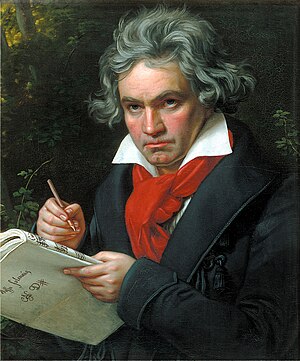Difference between revisions of "AY Honors/Music/Beethoven"
From Pathfinder Wiki
m (Template:Ay music beethoven moved to Adventist Youth Honors Answer Book/Music/Beethoven: tranclude) |
m (W126jep moved page Adventist Youth Honors Answer Book/Music/Beethoven to AY Honors/Music/Beethoven without leaving a redirect) |
||
| (8 intermediate revisions by 2 users not shown) | |||
| Line 1: | Line 1: | ||
| − | + | === [[w:Beethoven|Beethoven]], Ludwig van (1770-1827)=== | |
| − | === [ | + | {| border=0 |
| − | + | |- | |
| − | [[Image:Beethoven | + | |valign="top"|[[Image:Beethoven.jpg|300px|Beethoven]] |
| − | + | |valign="top"| | |
Beethoven was born in Bonn, Germany. His father and grandfather were both singers at the court of the prince of Cologne. By age eleven and a half he was the assistant organist at the court chapel and by twelve he had published some music. | Beethoven was born in Bonn, Germany. His father and grandfather were both singers at the court of the prince of Cologne. By age eleven and a half he was the assistant organist at the court chapel and by twelve he had published some music. | ||
| Line 9: | Line 9: | ||
His two best know compositions are his Fifth and Ninth Symphonies. The entire fifth symphony is united as a musical idea by the four notes heard at the beginning of the piece. His ninth symphony is known for its ending piece which includes a choir singing “Ode to Joy”. | His two best know compositions are his Fifth and Ninth Symphonies. The entire fifth symphony is united as a musical idea by the four notes heard at the beginning of the piece. His ninth symphony is known for its ending piece which includes a choir singing “Ode to Joy”. | ||
| + | |}<noinclude>[[Category:Adventist Youth Honors Answer Book/Transcluded Modules|{{SUBPAGENAME}}]]</noinclude> | ||

